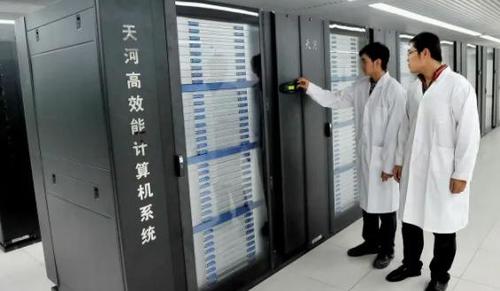US Adds Chinese Supercomputing Companies To Trade Blacklist
While Asian nations gently encourage President Biden to consider abandoning President Trump’s trade war against the Chinese – a trade war he has maintained for purely political reasons (he can no longer risk being seen as ‘soft’ on China for obvious reasons) – his administration is doing the exact opposite: they’re charging ahead.
The FT reports that the US Commerce Department has placed a gaggle of state-linked Chinese firms working on supercomputing technology on the “Entity List”, the trade blacklist that the Trump Adminsitration once used to bring Huawei to its knees (pressure that Biden is now relieving). Companies on the trade blacklist can’t do business with American firms unless they obtain a special license from the US government.
The US has placed Chinese groups accused of building supercomputers to help the Chinese military on an export blacklist, the first such move by the Biden administration to make it harder for China to obtain US technology.
Three companies and four branches of China’s National Supercomputing Center were added to the US government “entity list”, which bars American companies from exporting technology to the groups without a licence.
Commerce accused the companies of working on supercomputers for “military actors” and supporting programs for developing weapons of “mass destruction” – information likely gleaned from American intelligence.
The US commerce department said the groups were involved in building supercomputers used by Chinese “military actors” and facilitating programmes to develop weapons of mass destruction.
“Supercomputing capabilities are vital for the development of many — perhaps almost all — modern weapons and national security systems, such as nuclear weapons and hypersonic weapons,” said Gina Raimondo, the US commerce secretary.
She said the administration would use “the full extent of its authorities to prevent China from leveraging US technologies to support these destabilising military modernisation efforts”.
The Chinese entities are Tianjin Phytium Information Technology, Shanghai High-Performance Integrated Circuit Design Center, Sunway Microelectronics and the National Supercomputing Center branches.
The US is worried that these technologies will help the PLA “close the gap” with the US military in the Pacific. For those who haven’t been paying attention, the Pacific, where the American Navy is actively engaged in pushing back against Chinese military expansionism, is the domestic front in a cold war.
But the even bigger concern here is that China is building these supercomputers with US military technology via a company called Phytium
The Chinese entities are Tianjin Phytium Information Technology, Shanghai High-Performance Integrated Circuit Design Center, Sunway Microelectronics and the National Supercomputing Center branches.
The US is concerned about China gaining access to American technology that helps the People’s Liberation Army close the gap with the US military and field weapons that could alter the balance of power in the Indo-Pacific.
The Washington Post this week said Phytium designed semiconductors using US technology to power supercomputers being employed to develop hypersonic missiles, which are hard to detect because of their speed.
The newspaper said Phytium used technology from Cadence Design Systems and Synopsys. The entity list move would effectively prevent the two California-based companies from providing services and products to the Chinese firms. But it would not bar them from supplying the Chinese groups if that technology were produced in facilities outside of the US.
The Washington Post said Phytium outsourced the manufacturing of its chips to TSMC, the Taiwanese company that has become the world’s most advanced semiconductor manufacturer.
China’s propagandists replied to the news by proclaiming that the US “Entity’s List” is like an “honor list” for loyal Chinese firms.
The US’ Entity List can be seen as an “honor list” for China’s high-tech companies. If companies did not make the list, they will feel embarrassed, because it shows that they are not good enough. pic.twitter.com/p1GciKVLxE
— Hu Xijin 胡锡进 (@HuXijin_GT) April 9, 2021
Beijing responded to the news Friday morning by threatening to take “necessary action” to retaliate against the US. Beijing has often threatened to add American companies (like Fedex, which became the center of a retaliatory investigation back in 2019) to an “enemies list”.
The question now is whether Washingtn will up the pressure on TSMC, the Taiwanese Semiconductor Giant from which the US is desperately trying to disentangle its supply chains, to drop Phtium and the others as a client.
Tyler Durden
Fri, 04/09/2021 – 08:36
via ZeroHedge News https://ift.tt/3dNgVSf Tyler Durden
